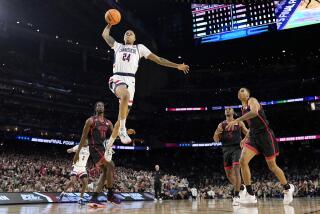International Wait Line Is Bad for CBS
- Share via
NAGANO, Japan — This just in on CBS: In their fifth attempt, the fourth with John Elway at quarterback, the Denver Broncos won the Super Bowl with a victory over the Green Bay Packers.
Back when I used to watch sports on CBS, back when the network televised professional football games, I don’t remember that it had any particular problems showing news when it happened. If there was an important NFC game on a Sunday, we could all count on at least seeing highlights before the day ended.
Is it possible CBS has forgotten how to cover sports?
Were John Madden and Terry Bradshaw really the brains behind the operation?
These questions are pertinent because of the network’s coverage, or should I say non-coverage, of Picabo Street’s remarkable victory Wednesday in the women’s super-giant slalom.
When I called home to California to share my excitement, I couldn’t find anyone who wanted to talk about it. Hardly anyone even knew about it. People were still talking about Akebono in the opening ceremony, which happened four days earlier.
A couple of days later, the buzz here was about the men’s figure skating short program. When I called home, no one wanted to talk about anything except Picabo Street.
I’ll admit that I’m no expert on Olympic television coverage. Because I’ve been assigned to cover the Games in recent years, I haven’t seen much of them on TV since the 1984 Winter Games from Sarajevo. But there are two things I do know. One is that the masses at home were always complaining about the coverage. The other is that the masses were watching.
I, however, have never heard as many people at home turned off by the coverage as this year. More worrisome for CBS and its advertisers is that that attitude has been reflected in the ratings, which have dropped significantly from those in Albertville, France, in 1992 and Lillehammer, Norway, in 1994.
CBS officials ask for compassion. They say this is the most difficult Olympics ever to televise, largely because of the time difference between Japan and the United States ranging from 14 hours on the East Coast to 17 on the West Coast. I’ll give them that much. This also is the most difficult Olympics in my experience to cover for a newspaper.
But it was within CBS’ power to do something about that for all of us.
Facing a similar challenge in Seoul, South Korea, for the 1988 Summer Olympics, NBC dictated a schedule enabling the network to televise many marquee events live in prime time in the United States. As a result, the gun went off for the 100-meter final in the midday sun.
CBS could have done the same thing here. Paying a record $375 million to the IOC for the U.S. rights, CBS could have asked Juan Antonio Samaranch to wear a cheesehead in the opening ceremony and he would have done it.
This just in on CBS: The Florida Marlins, led by rookie pitcher Livan Hernandez from Cuba, won the World Series in only their fifth season in seven games over the Cleveland Indians.
About the best the network tried for was to get some of the men’s ice hockey games on immediately after David Letterman’s “Late Show.”
For instance, the U.S.-Canada men’s ice hockey game begins at 1:45 p.m. here Monday and will be shown live in New York at 11:45 p.m. the night before. That means CBS could have shown that game on the West Coast in prime time at 8:45 p.m. For some reason I’ll never understand, the decision was to delay it so that it starts at 11:45 p.m. there too.
CBS’ strategy here was to package the news. Instead of televising the figure skating as it happens, the network chose to choreograph the coverage, inserting up-close-and-personal profiles, commentary and, of course, commercials whenever it desired and allowing you to see it a day later.
The network, however, found itself short of programming when weather forced postponement of Alpine skiing and snowboarding events normally scheduled for morning hours, naturally coinciding with prime time in the United States.
The result is that CBS has been filling time with women’s figure skating practices, asking Michelle Kwan inane questions about whether she feels her Chinese heritage tugging at her because she’s in Japan.
She politely informed the inquisitor, “CBS Morning News” weatherman Mark McEwen, that the histories, traditions and cultures of the two countries are vastly different.
The weatherman should have been in the mountains.
So should CBS on the day Street won the gold medal.
There’s not much happening here at reasonable hours in the United States. When there is, CBS should show it.
Street finished her run a little after 11 p.m. on the East Coast, 8 p.m. on the West Coast. You got to see it 26 hours later.
CBS’ lead producer, Rick Gentile, defended the decision, saying the network protected exclusivity of its tape of the race by waiting to televise it until the following evening.
He also said he believed viewers would still tune in.
“The last time I checked, everyone who goes to see ‘Titanic’ knows how that ends, but they still go to see it,” he told the Washington Post.
Unless Michelle, Tara and Nicole can rescue it next week, a more apt analogy for CBS’ coverage might be the real Titanic.
This just in on CBS: Picabo Street finished second in the women’s downhill. In Norway.
More to Read
Go beyond the scoreboard
Get the latest on L.A.'s teams in the daily Sports Report newsletter.
You may occasionally receive promotional content from the Los Angeles Times.










